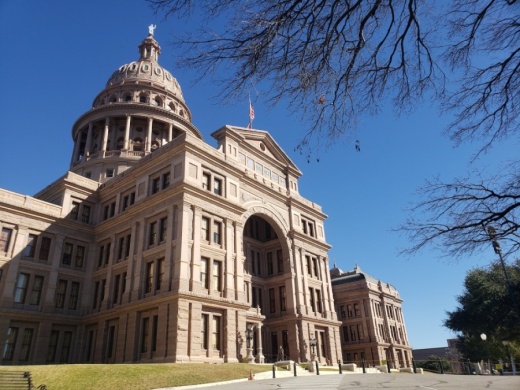The full texts and statuses of these and other bills may be found through the Legislature’s website.
Senate Bill 7, jointly authored by Creighton and 12 of his Republican colleagues, proposes several new regulations for Texas elections, including the voter registration process, voting by mail, and “election security” items relating to polling place locations and facilities, voting hours and ballot auditing.
Harris County saw record voter turnout during the November 2020 election amid some elections operations that would run afoul of SB 7’s new requirements. County Judge Lina Hidalgo responded to the bill’s filing March 15 by touting the county’s elections administration and opposing the Republican senate bill. Gov. Greg Abbott announced his support for SB 7 and other election reform measures March 15.
SB 208, jointly authored by Creighton and four other Republican senators, would prohibit officials from sending out early voting ballot applications.
Several of Creighton’s bills—Senate Bills 1110 through 1116—were jointly authored with Sen. Paul Bettencourt, R-Houston, and other Republican senators. In a March 8 statement, Bettencourt said some of the measures were filed in response to what he has alleged were state election code violations and noncompliance throughout the COVID-19 pandemic and in last fall’s election.
“The November 2020 election demonstrated the lack of transparency and lack of integrity within the election process,” Bettencourt said. “The integrity of the voter roll is paramount to the entire electoral process and we must restore confidence in the voter roll for future elections for all Texans.”
SB 1110, jointly authored by Creighton and four other Republican senators, would require local judges to appoint a three-member panel of retired judges to serve as emergency election reviewers 60 days before an election. Candidates or political party chairs could then request a review of alleged election law violations by the panel within 45 days of an election.
SB 1111, jointly authored by Creighton and five other Republican senators, would require voters to produce certain evidence of their residence at the address where they are registered to vote if requested by the voter registrar.
SB 1112, jointly authored by Creighton and five other Republican senators, would bar elections officials from waiving signature verification requirements for early voting ballots.
SB 1113, jointly authored by Creighton and four other Republican senators, would allow the secretary of state to withhold some funding if a voter registrar does not complete their duties related to voter registration cancellation in a timely manner.
SB 1114, jointly authored by Creighton and five other Republican senators, would require voters to present proof of citizenship if their citizenship status was previously questioned though the jury selection process or in vehicle registration records.
SB 1115, jointly authored by Creighton and three other Republican senators, would limit early voting hours.
SB 1116, jointly authored by Creighton and five other Republican senators, would require counties and school districts to post election results online in a timely and accessible manner.
SB 1234, authored by Sen. Bryan Hughes, R-Mineola, and coauthored by Creighton, would require all voting systems to be subject to audits with paper records.
SB 1387, written by Creighton, would require all Texas voting systems to be manufactured and produced by a company headquartered in the U.S.
SB 1508, written by Creighton, would create an election integrity division within the Texas Attorney General's Office.
SB 1509, written by Creighton, would require photo identification to be submitted with early mail voting applications.
Senate Joint Resolution 51, authored by Creighton and Bettencourt, would present a constitutional amendment barring officials from sending out unsolicited absentee ballot applications to Texas voters in this November’s election.
House Bill 1724, written by Rep. Dennis Paul, R-Houston, and coauthored by Toth and three Republican representatives, would expand the responsibilities and permissions of election watchers.
HB 1725, written by Paul and coauthored by Toth and three Republican representatives, would ban in-person delivery of mail ballots.
HB 1979, written by Toth, would require mail ballots to be marked with unique codes for electronic identification.
HB 2263, written by Paul and coauthored by Toth and three Republican representatives, would prevent voters or election officials from “curing,” or fixing, ballots that initially do not meet requirements for acceptance by the registrar and would require that those ballots be rejected.
HB 2264, written by Paul and coauthored by Toth and three Republican representatives, would set a voting standard of four-fifths of a county elections commission to appoint, suspend or terminate an administrator.
HB 2265, written by Paul and coauthored by Toth and three Republican representatives, would limit early voting hours.
HB 2266, written by Paul and coauthored by Toth and three Republican representatives, would change some rules relating to the appointment of election judges, clerks and signature verification committee members.
HB 3105, written by Toth, covers a variety of topics related to social media platforms. The legislation includes provisions that would block such platforms from applying algorithms to limit the exposure of content relating to political candidates leading up to an election.





